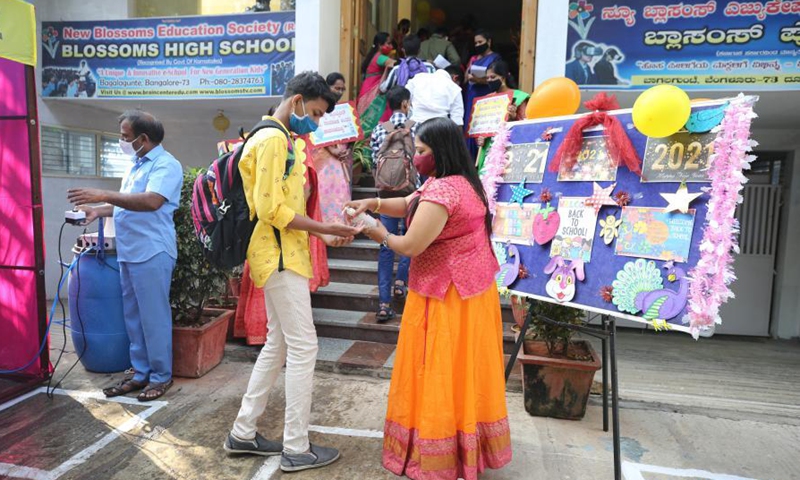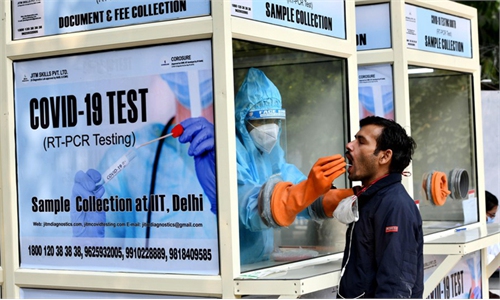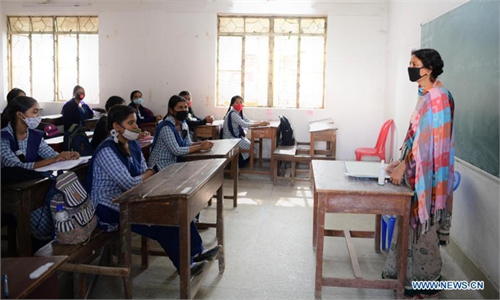India's vaccine export plan could be good news for global market despite political, economic motive: experts

A teacher offers hand sanitizer to a student at a school in Bangalore, India, Jan. 1, 2021. The southern state of Karnataka on Friday opened schools for students of grade 10 and 12 after a gap of more than nine months. (Str/Xinhua)
India expects to export its homemade coronavirus vaccines "within weeks" to satisfy the global market, according to media reports, which experts said could be a good news given India's competitive vaccine research and production capacity.
But the move could also aim at political brand-building to counter the international influence of Chinese vaccines despite China sets its own pace of a vaccine rollout, and seek to recoup the cost of giving free vaccinations to its own people, analysts said.
BBC reported Tuesday that India will begin exporting locally-made coronavirus vaccines within a fortnight of their launch, citing an Indian foreign ministry official.
The Indian drugs regulator has given the green light to two vaccines candidate against the coronavirus - one developed with British-Swedish biopharmaceutical company AstraZeneca and Oxford University (Covishield), and the other by local firm Bharat Biotech (Covaxin).
India makes about 60 percent of vaccines globally and many countries are eagerly waiting for it to begin shipping doses, according to the BBC report.
Experts suggested that India's vaccines are no less competitive than Chinese COVID-19 vaccines in both research and production capacity, considering that India has the world's largest vaccine manufacturer and lower costs in labor and facilities.
Despite India's reputation for generic drugs, the country is not behind China in vaccine R&D, Jiang Chunlai from Jilin University's School of Life Sciences, who had visited Bharat Biotech, told the Global Times on Wednesday.
"India has the world's largest vaccine manufacturer Serum Institute of India that has a very mature production and supply capacity, even stronger than some Western countries. Indian vaccine manufacturers also have a much earlier cooperation with global institutes including WHO, GAVI and the Pan American Health Organization in South America (PAHO), and earned their trust decades ago," he said.
"They take a closer approach to Western standards in vaccine development and regulation that has also helped their exports," Jiang said.
But Jiang warned that the phase three clinical data of its domestically-developed vaccine has not yet been released, which has triggered concerns over safety and efficacy.
Countries importing Indian-developed vaccines should not rashly roll out the vaccine to its own people given the absence of data and information, but can only apply it for emergency use, an official at the China Association for Vaccine told the Global Times on Wednesday.
Serum Institute of India CEO Adar Poonawalla told the BBC on Tuesday that his firm was allowed to export the vaccines for government immunization programs to potential countries, including Bangladesh, Saudi Arabia and Morocco in the next few weeks.
"India's export of vaccines to developing countries, especially to its neighbors, is aimed at boosting India's image. India also needs to export to recoup the cost of giving free vaccinations to its own people," said Zhao Gancheng, director of the Center for Asia-Pacific Studies at the Shanghai Institute for International Studies.
India hopes to counter the international influence of Chinese vaccines, even if China has always set its own pace and has no intention of competing, Zhao noted.
Partnerships with leading Western manufacturers have also boosted the credibility of India's vaccine exports, with countries such as Myanmar and Bangladesh showing willingness to buy, Zhao explained.
But it does not mean these countries disfavor vaccines developed by China or other countries, as it is common practice to import vaccines from different countries to support their own immunization programs, experts said.
Nepal People's Review Chief Editor Pushpa Raj Pradhan on Wednesday suggested that Nepal is also among those showing interest in buying Indian vaccines due to their lower price and shorter transition.
India and Nepal have similar climates and storage conditions for vaccines, which make many Nepalese trust Indian vaccines, Pushpa told the Global Times on Wednesday.
He suggested that the Nepalese also expect to access Chinese-researched vaccines, but the deal is still under negotiations due to relative high demand.



